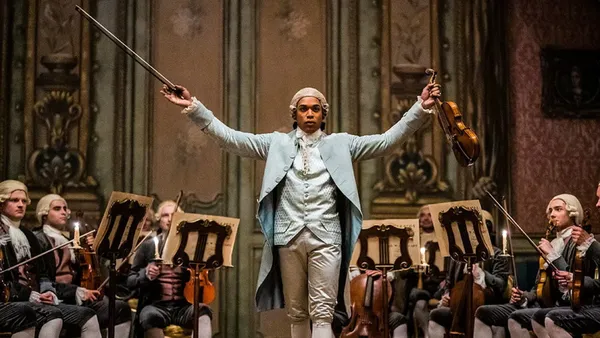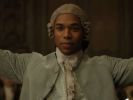Eye For Film >> Movies >> Chevalier (2022) Film Review
Chevalier
Reviewed by: Andrew Robertson

To some extent based on a true story, Chevalier is followed by text that adds context. Not least of which is why a figure of such potential import might now be unknown. It's Mozart who first asks 'who is that?' within the film, albeit with some more striking Germanic in the middle. Joseph Bologne, Chevalier de Saint-Georges has had his story fictionalised before. Previous to this, most notably in the 1840s by Roger de Beauvoir, the nom de plume of Eugene Roger, a friend of Alexandre Dumas (the elder). If that seems a complicated set of names and dates then know that it's indicative of both the history and this story.
A début feature for Stefani Robinson, whose writing work includes several episodes of adaptations to television Fargo and What We Do In The Shadows, as well as the dazzling Atlanta. Similarly, it is a début for director Stephen Williams, whose CV includes episodes of similar efforts like Watchmen and Westworld, as well as plenty of intrigue and conspiratorial series. Fitting both categories are episodes of Transporter: The Series and MCU interstitial Agent Carter. This might explain a phenomenon I'm minded to call 'topic sentence framing' where stakes and consequences are restated as if to allow audiences to catch up. Words like 'episodic' or 'patchwork' feel unkind but for all the boundaries its protagonist crosses and is caught upon the film struggles with a through line.

It screened as a première at Glasgow's 2023 Film Festival. Co-director Allan Hunter talked about the security precautions and asked the audience "please don't do anything you'd regret." The interaction between audience and entertainment is one of the keys to Chevalier. While the reception of the film was overwhelmingly positive, its subject's welcome was often less so.
From an initial exhibition match as a fencer, the roots and routes of ongoing conflict are well established. That's after some harsh language as young Joseph is brought to Paris to begin his musical training. There are several liberties (if not equalities and fraternities) taken with the actual history. For the most part these intersectionalities seem both fair and balanced, but there's also a sense that this is didactic. It is not unfair for Hollywood to attempt to reckon with colonial pasts through the lens of others' history, but the presence of what amounts to interpretive readalong does it and audiences a disservice. "You will not win this bout" is one of several places where potential subtleties are distorted by amplification. In that squall of symbolism the opportunity to recognise theme is obliterated, and that may be due to a lack of feedback but either way the consequence seems to drone on.
At one point it uses the phrase "prelude to Revolution," and the musical notes carry on elsewhere. Kris Bowers scores, another TV veteran, but The United States Vs Billie Holiday, Green Book and Respect are all much closer thematically. The music at many times feels more of the cinema than the stage. It makes use of pieces composed by Bologne, given fullness by the London Contemporary Orchestra. That sumptuousness extends to costume and production design, and while it's nice to see a period film that's willing to re-use costume for those who would have done so, this is still a privileged view of revolution. While it occasionally ventures to the streets, and at least once the barricades, these are not revolting peasants but salons in disquiet.
I've mentioned moments where it holds the audience's hands to conclusions, but there are stronger elements, subtler in their use. Mirrors and strings, looks and loops, but the quality in one place makes its lack elsewhere more jarring. There are plenty of contrasts but not all seem intentional. As with many period pictures it makes use of modern VFX. These include greenscreened backgrounds and at least one door that serves as a transition from a digital landscape. Costumes are beautifully constructed, and it's always nice to see them foregrounded as when Joseph buys his mother a dress.
The cast, and, importantly, background players show genuine variety. There's an orchestra near the end that is of mixed gender and race, assembled on a triumphant stage. They and their audience come into inevitable conflict with authority, though in an era often defined by great men the systemic is often personified. "L'etat c'est moi" might not feature, but when you've got anthropomorphism to this extent you don't need anyone in a Phrygian cap or holding up a torch to sell it.
In a strong ensemble, there are several striking soloists. Chief among them as the eponymous, Kelvin Harrison Jr. He comes to this from a striking run, with recent turns including Fred Hampton in The Trial Of The Chicago 7 and as BB King in Baz Luhrman's Elvis. Around him Ronke Adekoluejo as his mother, Nanon, Alex Fitzalan as best friend, Philippe, and as further counterpoint Samara Weaving, Lucy Boynton and Minnie Driver as romantic entanglements, patrons, and rivals. In as much as a film reliant upon systemic injustices can have baddies, Marton Csokas Montalembert counts, or at least Marquises. His works with fortifications include developments of the tenaille, a structure perpendicular to the walls to allow supporting fire. That his relations with Bologne start with an obvious declaration of his angle on proceedings might speak more to my fondness for military history, but it's nice that it supports that interpretation.
This is hardly a bastion of accuracy, but it does cover its ground well. Where it disappoints is that it's often obvious, too often undermining itself by insisting on just one string for its bow. "No one may tear down an excellent Frenchman" could well be true, but it is possible to do them a disservice. Chevalier should be honoured for its ambition, but it often seems to strike the wrong notes.
Reviewed on: 13 Mar 2023

















